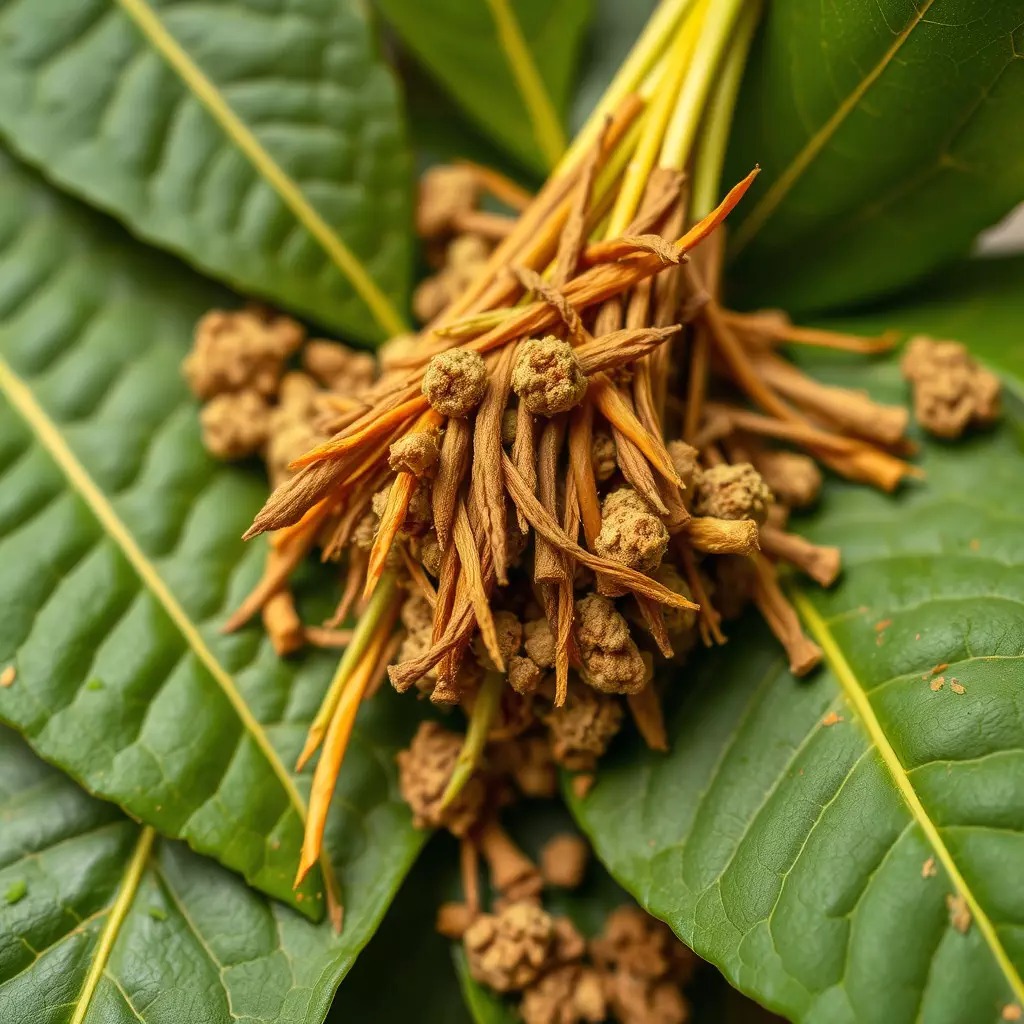Kratom, from the Mitragyna speciosa plant, is a well-known herbal supplement that offers an energy boost and potential mood enhancement. Its active compounds, mitragynine and 7-hydroxymitragynine, interact with opioid receptors in the brain, affecting mood and energy levels. Strains like Maeng Da and White Vein kratom are popular for their stimulating effects, which can help users combat fatigue and increase vitality naturally, serving as an alternative to caffeine or synthetic stimulants. While it's linked to improved mood and may aid in managing symptoms of anxiety and depression, it's essential to approach kratom with caution due to its regulatory status, individual responses, and the need for professional guidance before use. The variability in effects necessitates a personalized and careful examination within the context of one's health practices. Ongoing scientific research into kratom's effects on mood and energy should be considered, along with potential risks, before incorporating it into a wellness regimen for an energy boost or emotional support.
navigating the complexities of emotional well-being can be a journey towards greater health and vitality. This article explores the nuanced relationship between kratom and its potential to support emotional balance and energy levels. By delving into the scientific aspects of kratom’s effect on mood regulation, readers will gain insights into how this substance might be integrated into a holistic wellness plan for an energy boost with kratom and improved overall well-being. Join us as we unravel the multifaceted role of kratom in promoting emotional health and enhancing daily vitality.
- Understanding Kratom's Role in Emotional Well-Being and Energy Levels
- Exploring the Science Behind Kratom and Its Impact on Mood Regulation
- Integrating Kratom into a Holistic Approach for Enhanced Emotional and Physical Vitality
Understanding Kratom's Role in Emotional Well-Being and Energy Levels

Kratom, a plant native to Southeast Asia, has garnered attention for its potential impact on emotional well-being and energy levels. Its leaves contain compounds called alkaloids, which interact with the brain’s opioid receptors, influencing mood and energy. For individuals seeking an energy boost with kratom, certain strains like Maeng Da or White Vein are often favored due to their stimulating effects, which can help combat fatigue and enhance vitality. These effects may provide a natural alternative for those looking to manage their daily energy needs without resorting to caffeine or other synthetic stimulants. Additionally, the mood-enhancing properties of kratom have been reported to alleviate symptoms of anxiety and depression, contributing positively to overall emotional health. It’s important to approach the use of kratom with caution, as it can be subject to regulatory oversight and its effects may vary from person to person. Users should seek guidance from healthcare professionals before incorporating kratom into their wellness routine, especially considering its potential for interactions with other substances and its varying legality across regions. Understanding the nuances of kratom’s influence on emotional well-being and energy levels requires a careful consideration of individual responses and the context of use.
Exploring the Science Behind Kratom and Its Impact on Mood Regulation

Kratom, a tropical evergreen tree native to Southeast Asia, has been the subject of increasing scientific scrutiny due to its potential effects on mood regulation and energy levels. The active compounds found in kratom leaves, known as mitragynine and 7-hydroxymitragynine, interact with the body’s opioid receptors, which can influence an individual’s emotional state. Research indicates that kratom may offer an energy boost, often reported by users who consume it in lower doses. This energizing effect is thought to stem from its stimulant properties, which can enhance alertness and mental clarity, thereby supporting individuals experiencing fatigue or low energy levels.
Furthermore, the mood-regulating potential of kratom is a focal point of ongoing research. Users have reported that certain strains of kratom can induce feelings of well-being and elation, providing a sense of emotional balance. The impact of kratom on mood appears to be complex, with its effects varying depending on the strain, dose, and individual physiology. It’s important for individuals considering kratom for emotional well-being support to approach it cautiously, as the substance can have varying effects and is subject to regulatory scrutiny in many countries. Prospective users should seek guidance from healthcare professionals and consider the scientific evidence when integrating kratom into their self-care routines for mood regulation and energy management.
Integrating Kratom into a Holistic Approach for Enhanced Emotional and Physical Vitality

Kratom, a botanical derivative from the leaves of Mitragyna speciosa, has garnered attention in holistic health circles for its potential to contribute to emotional and physical vitality. Proponents suggest that kratom can offer an energy boost with kratom, which may be beneficial for individuals seeking to enhance their daily well-being. This natural substance is known for its alkaloid profile, which includes mitragynine and 7-hydroxymitragynine, compounds believed to interact with the body’s opioid receptors, influencing mood and energy levels. When integrated into a holistic approach to health, kratom can serve as a complementary tool alongside other wellness practices such as meditation, exercise, and proper nutrition. It’s important for individuals to approach kratom with caution and consult with healthcare professionals before incorporating it into their routine, as its effects can vary greatly depending on dosage and individual sensitivity.
For those navigating the challenges of emotional distress or fatigue, an energy boost with kratom might provide a new lease on life, allowing them to engage more fully with activities that promote overall well-being. It’s essential to use kratom responsibly as part of a comprehensive strategy for health and vitality. This approach ensures that individuals receive balanced support for their emotional and physical states, potentially leading to improved mental clarity, increased resilience, and heightened energy levels. By integrating kratom into a holistic wellness regimen, individuals may find a harmonious balance that fosters both emotional and physical vitality, contributing to an enhanced quality of life.
In conclusion, the intersection of Kratom’s role in modulating mood and its potential for an energy boost with kratom offers a compelling perspective on holistic approaches to emotional well-being. The scientific evidence supporting Kratom’s impact on mood regulation underscores its therapeutic promise. Integrating Kratom sensibly within a comprehensive self-care regimen can contribute significantly to both emotional and physical vitality. It is clear that further research into the safe and effective use of Kratom for emotional well-being support is warranted, with careful consideration given to individual needs and circumstances. A balanced approach that includes professional guidance is key to harnessing Kratom’s benefits responsibly.






